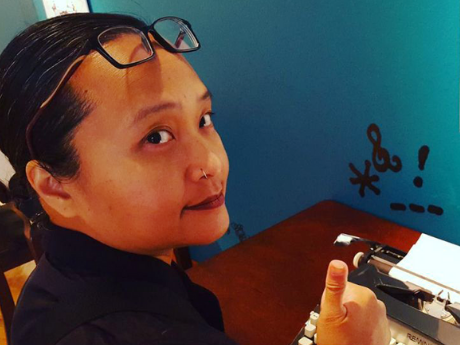In Their Own Words
Barbara Jane Reyes on “An Apology”

An Apology
For Norife Herrera Jones
We didn't shout in the streets for you.
There were no raised fists, no cameras.
Where the Pajaro River opens its mouth,
to guide our elders back to native waters,
there was no one to bless your passage.
We didn't fight for you. We forgot to cast
our nets for you. We didn't know you were
falling. We should have caught you. When
we didn't see you we blamed the TV,
when the TV noise smothered you, when
the TV forgot to say your name, when
you ran, when you broke into pieces. We
should have recognized your name as kin.
We should have raised our voices for you.
We should have raised all hell for you,
whetted our teeth and talons, as blades,
as spears. We should have thundered, so
your spirit would know its way home.
From Invocation to Daughters (City Light Books, 2017). All rights reserved. Reprinted with the permission of the author.
On "An Apology"
Writing a poem to Norife Herrera Jones, a woman I never knew personally, was fraught with questions about right. What is right. Do I have the right.
I remembered her name from local TV news. In 2012, a Filipina's California ID photo was flashed at us, as newscasters enumerated upon the grisly details of her murder. All the news I remember during that time was either borderline torture porn, or squarely focused on humanizing her murderer, her septuagenarian, estranged white husband, a Stanford University alumnus, a professor at the Naval Postgraduate School in Monterey. "He was a quiet man." "He was nice."
Norife Herrera Jones was 29 when she was murdered by this "quiet man."
Newscasters mispronounced her name as two syllables with a long "i" sound.
It should have been three syllables with a long "e," ending with a long "a." Nor-ee-fay.
Her friends called her Janie.
After a couple of days of local news media mispronouncing her name and further humanizing her murderer, and further detailing her gruesome murder, it all just stopped. I didn't hear another word. I couldn't find anything online.
In 2016, he was sentenced to serve 50 years to life. I'm not going to include his name here.
When I was launching my book To Love as Aswang at the Philippine Consulate in San Francisco in 2015, my community was protesting outside, because of the murder of Jennifer Laude, a transgender Filipina murdered by a US marine. Laude's murder in 2014 made international headlines, and compelled so many into action. Here, we are looking at the larger picture of the pervasive US military presence in the Philippines due to the Visiting Forces Agreement between the USA and the Philippines, and we are also looking at how our societies fail to value the life of a transgender person.
This series of protests on Laude's behalf, along with the series of protests and international attention surrounding Mary Jane Veloso, the Overseas Filipina Worker sentenced to death as an accused drug mule in Indonesia, made me question why no one in our community knew about Norife Herrera Jones, who was a woman once living among us, here in Northern California, which boasts one of the largest, oldest, most organized Filipino American communities in this country. Why this big empty space, for whom do we advocate. How do we decide for whom we come out en masse. Whose lives do we know to honor.
I always think of one of my poetic ancestors, the late poet Jeff Tagami, when I cross the Pajaro River, on the way to and from Monterey. He passed away, also in 2012. I always say, "Hi Jeff," and I place my hand over my heart. Tagami's gorgeous October Light (Kearny Street Workshop, 1987) is centered around that river, the community's life vein emptying into Monterey Bay, and into the Pacific Ocean. These days, when I am crossing the Pajaro River, I think of Jeff Tagami, and I think of Norife Herrera Jones. I think of the waters of the Pajaro, eventually making their way back to the Philippines.



